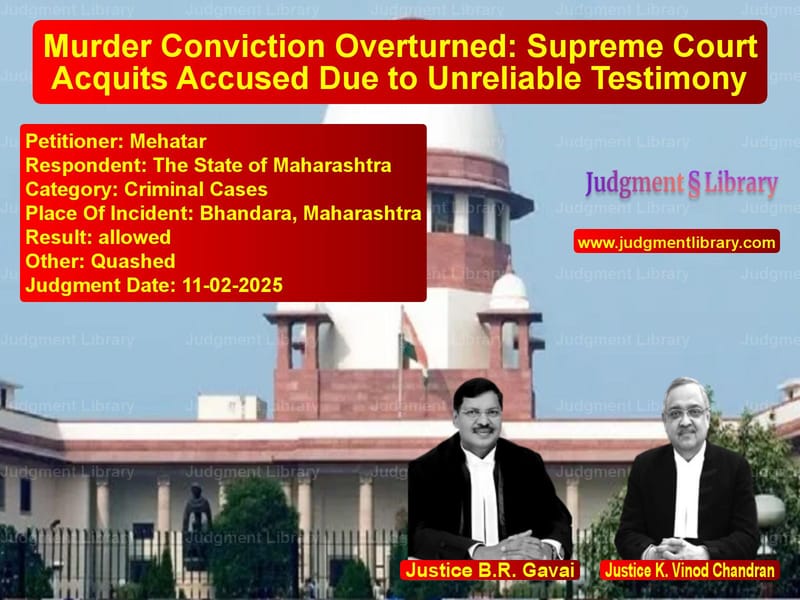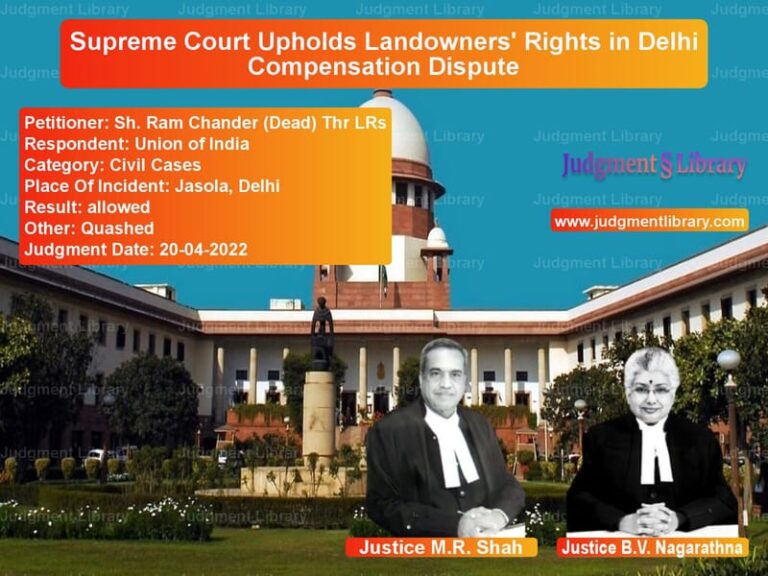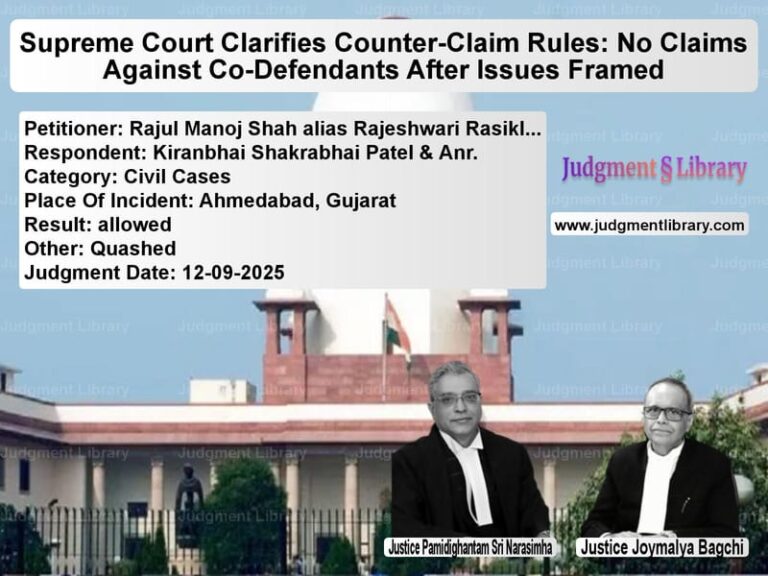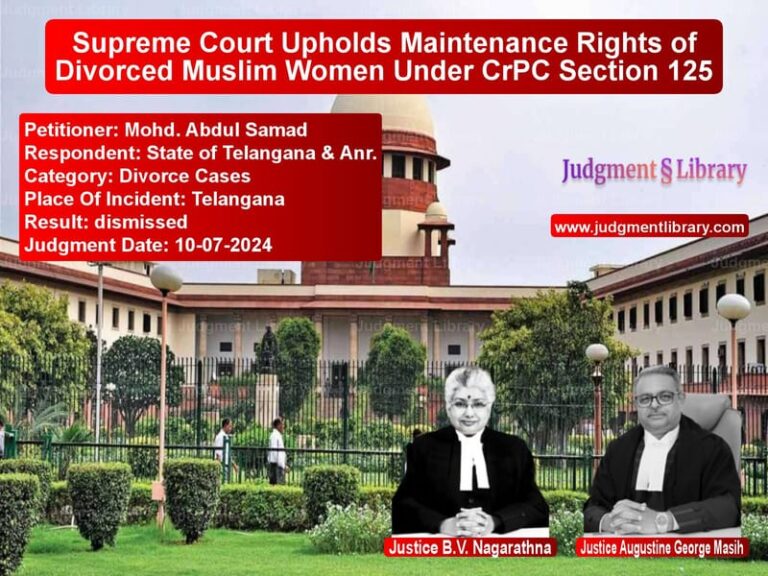Murder Conviction Overturned: Supreme Court Acquits Accused Due to Unreliable Testimony
The Supreme Court of India recently delivered a crucial judgment in the case of Mehatar vs. The State of Maharashtra, addressing the fundamental principle of criminal law—whether a conviction can be sustained solely based on the testimony of an interested or partially unreliable witness. The case involved a brutal attack leading to the murder of two individuals, for which multiple accused were initially convicted. However, upon closer examination, the Supreme Court found inconsistencies in the prosecution’s case, ultimately granting the accused the benefit of the doubt.
The case revolved around the alleged unlawful assembly and assault resulting in the deaths of two individuals in a village in Maharashtra. The appellants, Rajkumar Baburao Lade and Mehatar, were convicted by the trial court under Sections 147, 148, 452, and 302 read with Section 149 of the Indian Penal Code (IPC) and sentenced to life imprisonment. The Bombay High Court upheld the conviction, rejecting their appeals. The case reached the Supreme Court, where the appellants challenged the findings of the lower courts.
Background of the Case
According to the prosecution, the dispute arose due to longstanding animosity between the complainant, Sindhubai (PW-1), and the accused, particularly Rajkumar. The conflict stemmed from the accused’s livestock damaging Sindhubai’s crops, leading to frequent quarrels.
Read also: https://judgmentlibrary.com/dowry-death-and-acquittal-supreme-court-reverses-husbands-conviction/
On December 20, 2005, Sindhubai alleged that Rajkumar, along with other accused, entered her house and assaulted her husband and brother-in-law. She claimed that Rajkumar had an axe, while others carried sticks, using them to fatally attack the victims. Sindhubai managed to escape and took refuge in the house of Sitabai. She later narrated the incident to the village Sarpanch and Police Patil, who then informed the police.
The prosecution relied primarily on Sindhubai’s testimony, arguing that her detailed account established the guilt of the accused beyond reasonable doubt.
Arguments by the Appellants
The learned counsel for the appellants argued:
- The prosecution’s case was based solely on the testimony of Sindhubai (PW-1), an interested witness, making it unreliable without corroboration.
- The High Court had already acquitted six other accused based on inconsistencies in Sindhubai’s testimony, yet convicted the appellants on the same evidence.
- There were discrepancies in the timing and recording of the FIR, raising doubts about its authenticity.
- Independent witnesses who could have corroborated the prosecution’s case, such as Sitabai and Tekaram Rahagadale, were not examined.
- The police investigation was flawed, with crucial evidence not being properly documented.
Arguments by the State
The prosecution countered:
- The testimony of a single witness can be sufficient for conviction if found credible.
- Sindhubai provided a detailed account of the crime, identifying the accused and describing their actions.
- Minor contradictions in testimony are expected from a witness who is a rustic villager and do not undermine the core of the prosecution’s case.
- The medical evidence supported Sindhubai’s version of events.
Supreme Court’s Observations
The Supreme Court examined Sindhubai’s testimony with caution, given that she was an interested witness. The Court referred to the principle laid down in Vedivelu Thevar v. State of Madras, where it was held that the testimony of a single witness can be categorized into:
- Wholly reliable
- Wholly unreliable
- Neither wholly reliable nor wholly unreliable
The Court observed:
“In cases where a witness is found to be partly reliable and partly unreliable, the conviction should not be based on such testimony unless corroborated by independent evidence.”
Additionally, the Court noted several inconsistencies in Sindhubai’s statements:
- She claimed to have seen the accused attacking the victims, but the High Court itself doubted whether she could have witnessed the incident.
- The prosecution failed to examine key witnesses such as Sitabai and Tekaram Rahagadale, who could have corroborated her version.
- Police Patil (PW-4), who was expected to support her statement, turned hostile.
- The High Court acquitted some accused due to doubts about their involvement but convicted others based on the same evidence.
Verbatim Court Observations
The Supreme Court made critical observations regarding the inconsistencies in the case:
“If the learned Judges of the High Court find the testimony of Sindhubai (PW-1) to be doubtful on the issue as to whether she could have witnessed the incident or not, then it is difficult to appreciate as to how the High Court believed that she could witness the assault by other three accused.”
On the importance of corroboration, the Court emphasized:
“When the evidence of a sole witness is found to be doubtful, then the courts would always seek for some corroboration while maintaining the conviction.”
Final Judgment
In light of these findings, the Supreme Court held that the prosecution failed to prove its case beyond reasonable doubt. The key conclusions were:
- The conviction of the appellants was based on the testimony of a single witness, which was not wholly reliable.
- There was no corroboration from independent witnesses.
- The investigation contained several inconsistencies.
- The accused were entitled to the benefit of the doubt.
Accordingly, the Supreme Court allowed the appeal and quashed the convictions. The appellants were acquitted of all charges.
Conclusion
This judgment reinforces a fundamental principle of criminal law—convictions must be based on reliable evidence that withstands judicial scrutiny. If the testimony of a sole witness is found to be partially unreliable, corroboration becomes essential. The ruling ensures that courts apply rigorous standards before depriving individuals of their liberty, maintaining the balance between justice and fairness.
Petitioner Name: Mehatar.Respondent Name: The State of Maharashtra.Judgment By: Justice B.R. Gavai, Justice K. Vinod Chandran.Place Of Incident: Bhandara, Maharashtra.Judgment Date: 11-02-2025.
Don’t miss out on the full details! Download the complete judgment in PDF format below and gain valuable insights instantly!
Download Judgment: mehatar-vs-the-state-of-maharas-supreme-court-of-india-judgment-dated-11-02-2025.pdf
Directly Download Judgment: Directly download this Judgment
See all petitions in Murder Cases
See all petitions in Bail and Anticipatory Bail
See all petitions in Judgment by B R Gavai
See all petitions in Judgment by K. Vinod Chandran
See all petitions in allowed
See all petitions in Quashed
See all petitions in supreme court of India judgments February 2025
See all petitions in 2025 judgments
See all posts in Criminal Cases Category
See all allowed petitions in Criminal Cases Category
See all Dismissed petitions in Criminal Cases Category
See all partially allowed petitions in Criminal Cases Category







